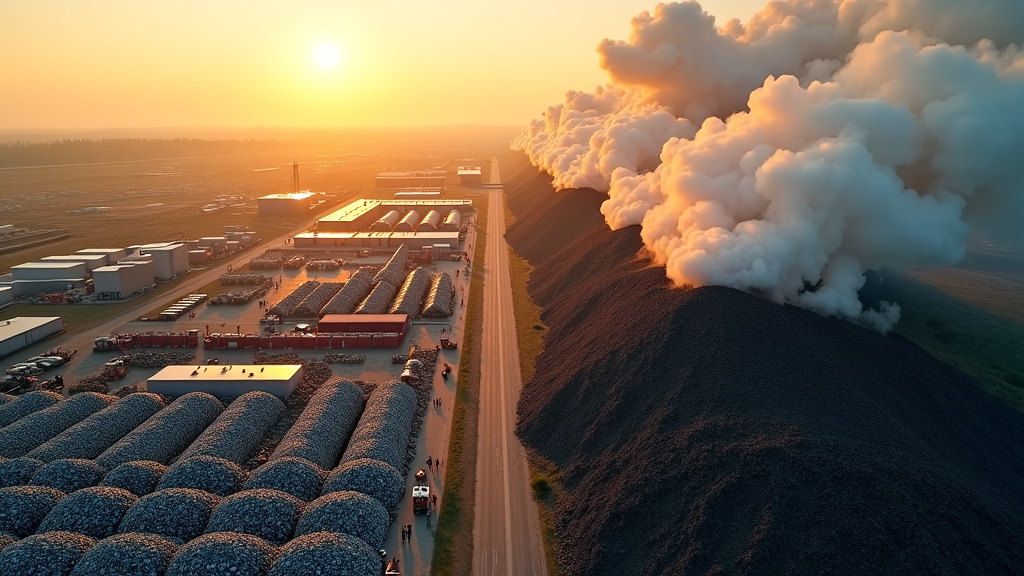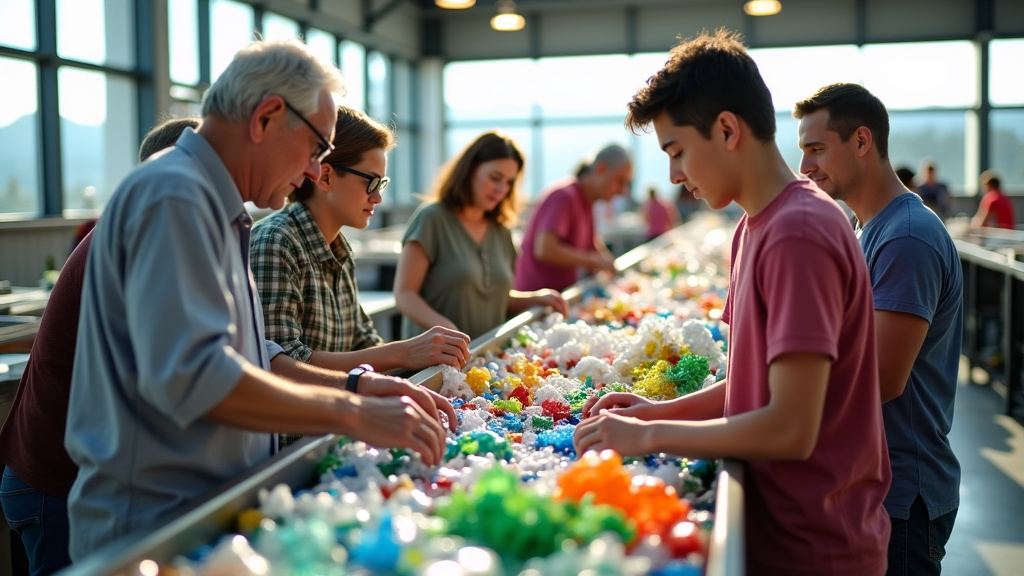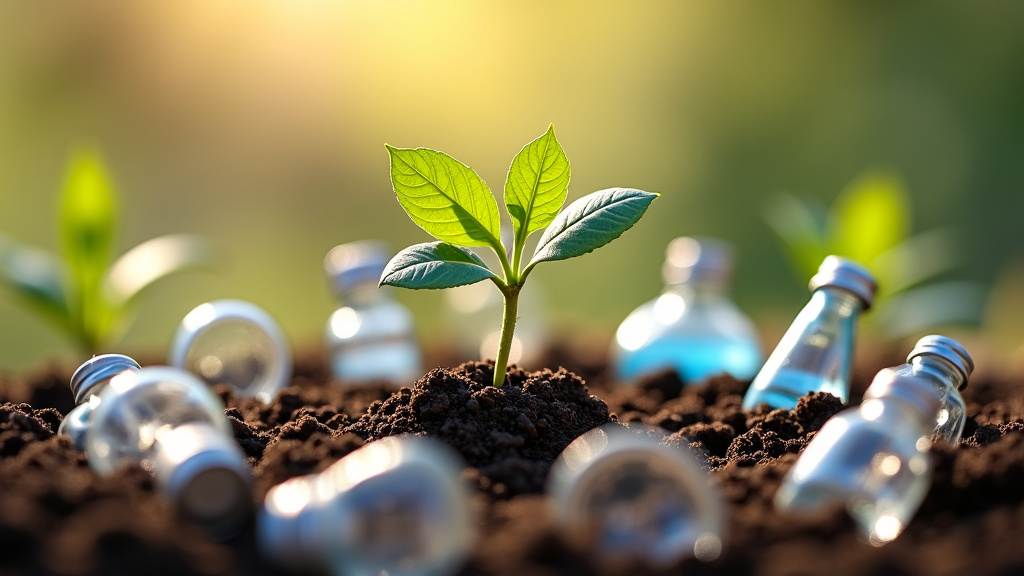5901 Botham Jean Blvd, Dallas, TX 75215
How Recycling Benefits the Environment
February 7, 2025Did you know that only 32.1% of municipal solid waste in the United States was recycled or composted in 2018? Imagine the environmental impact if more people embraced recycling as a daily habit.
It’s not just about keeping our streets clean—it’s a powerful tool for sustainability that reduces waste, conserves resources, and cuts pollution.
But recycling goes beyond just sorting trash. It’s a key process that helps reduce landfill waste, lower energy consumption, and combat climate change. When materials like metals, plastics, and paper are recycled instead of discarded, we preserve natural resources and minimize destructive extraction practices.
Take aluminum as an example. Recycling a single can saves 95% of the energy required to produce new aluminum from raw materials. This means that small, everyday actions—like choosing to recycle instead of tossing something in the trash—can have a huge impact on global sustainability.
Beyond energy savings and waste reduction, recycling also supports economic growth. The recycling industry creates over 1.1 million jobs in the United States alone, generating billions in annual revenue while promoting eco-friendly manufacturing.
Leading this movement is Okon Recycling, a company dedicated to transforming waste into valuable resources. By using advanced recycling technologies, Okon ensures that metal scraps and other recyclable materials are efficiently processed and reintroduced into the supply chain—reducing environmental impact while maximizing economic benefits.
As we explore the far-reaching benefits of recycling, we’ll uncover how this simple act contributes to climate action, resource conservation, and economic sustainability.
Reducing Pollution and Environmental Impact

Picture this: mountains of trash piling up, noxious fumes wafting through the air, and toxic chemicals seeping into our soil and water. It’s not a pretty sight, is it?
But here’s the good news – recycling offers a powerful remedy to this environmental nightmare. By diverting waste from landfills, recycling tackles pollution directly, reducing both greenhouse gas emissions and environmental contamination.
When we recycle, we’re not just clearing space in our trash bins. We’re actively reducing the volume of waste that ends up in landfills. According to the Environmental Protection Agency, Americans generated about 292.4 million tons of municipal solid waste in 2018. Imagine if we could significantly decrease that number through robust recycling efforts!
But the benefits don’t stop there. Recycling is a game changer for energy conservation. When manufacturers use recycled materials instead of virgin resources, they typically consume much less energy.
| Material | Energy Savings |
|---|---|
| Aluminum | 95% |
| Plastic | 66% |
| Steel | 60-74% |
| Glass | 30% |
| Paper | 60% |
Reducing Greenhouse Gas Emissions
Here’s where things get exciting. By reducing energy consumption, recycling curtails greenhouse gas emissions. Every time we choose recycled products over new ones, we’re effectively lowering the thermostat on global warming. It’s like giving Mother Earth a cool, refreshing drink on a scorching summer day.
But wait, there’s more! Recycling also helps keep harmful pollutants out of our air and water. When waste decomposes in landfills, it releases methane – a potent greenhouse gas that traps heat in our atmosphere. By diverting organic materials like food scraps and yard waste to composting facilities instead of landfills, we can dramatically reduce methane emissions.
Combating Environmental Contamination
Now, let’s talk about a real environmental threat: leachate. This toxic mix forms when rainwater filters through landfill waste, picking up harmful chemicals along the way. It’s like a sinister soup that can poison our soil and groundwater if left unchecked. By recycling, we reduce the amount of waste in landfills, thereby minimizing the potential for leachate formation.
Consider this fact: a single battery carelessly tossed in the trash can contaminate 20 square feet of soil and 100 liters of water. Now multiply that by the millions of batteries discarded each year, and you begin to grasp the magnitude of the problem. Recycling these items properly keeps dangerous heavy metals and corrosive chemicals out of our environment.
Recycling as a Driver of Economic Growth
The recycling industry has become a powerhouse of job creation and innovation, contributing significantly to the U.S. economy by generating employment opportunities across various sectors and skill levels.
According to recent data from the U.S. Environmental Protection Agency, the recycling and reuse industry supports over 681,000 jobs nationwide. This impressive figure highlights the sector’s role in fostering economic resilience. These positions span a wide range, from collection and sorting to high-tech processing and innovative product development.
Consider Sarah Chen, a chemical engineer who transitioned from traditional plastics manufacturing to developing new recycling technologies. “I never imagined my career would lead me here,” she explains, “but now I’m at the forefront of creating sustainable materials from what was once considered waste. It’s not just a job; it’s a mission.”
The economic impact of recycling extends beyond direct employment. For every 1,000 tons of recycled materials, the industry generates $65,230 in wages and $9,420 in tax revenues, according to the EPA’s 2020 Recycling Economic Information (REI) Report. This translates to substantial economic benefits for communities across the country, providing a stable source of income for many families.
| Year | Direct Economic Impact (billion USD) | Supplier Economic Impact (billion USD) | Induced Economic Impact (billion USD) | Total Economic Impact (billion USD) |
| 2021 | 46.39 | 35.35 | 35.09 | 116.84 |
| 2020 | 14.50 | 10.63 | 10.56 | 35.70 |
The recycling industry is also a hub of innovation, driving advancements in material science and manufacturing processes. Companies are developing new technologies to improve recycling efficiency. For example, artificial intelligence and robotics are now used to sort materials more accurately and quickly, increasing the value of recycled materials and opening new market opportunities.
Sustainable Practices Driving Economic Growth
The push for sustainability has created a symbiotic relationship between environmental concerns and economic growth. As businesses and consumers demand more sustainable products, the recycling industry has stepped up to meet this need, creating new markets and revenue streams.
Innovative companies are finding ways to upcycle materials into high-value products. Some firms are transforming plastic waste into construction materials, while others use recycled textiles to create designer fashion items. These initiatives reduce waste and create profitable business models contributing to the circular economy.
Recycling’s economic benefits are not limited to urban centers. Rural communities, often affected by the decline of traditional industries, are finding new economic lifelines through recycling initiatives.
The Role of Education and Community Involvement in Recycling

In addressing the challenges of waste and environmental degradation, education and community involvement have become vital tools. These efforts go beyond sorting trash; they aim to change mindsets and cultivate a shared commitment to sustainability.
Educational programs are crucial for building recycling awareness. From elementary schools to universities, these initiatives are instilling environmental consciousness in both young and mature minds. A recent study by the International Research and Engineering Journal emphasized that “without environmental education, more time and resources will be spent on futile waste management.”
However, knowledge alone is insufficient. Community initiatives invigorate recycling efforts, turning abstract concepts into practical actions. Consider the São Paulo recycling cooperative in Brazil. This grassroots movement not only processes recyclables but also provides employment and education to locals, transforming waste into a community asset.
The Power of Public Awareness
Public awareness campaigns connect education to action. They highlight the consequences of poor waste management and demonstrate the benefits of responsible recycling. These campaigns are not just about statistics; they tell compelling stories that resonate with people’s values and emotions.
Take the small town of Kamikatsu in Japan. Through innovative community engagement strategies, they have achieved an impressive recycling rate of over 80%. It’s a testament to what can be achieved when awareness meets commitment.
Yet, change isn’t always easy. Many communities encounter obstacles in implementing effective recycling programs, such as limited resources, inadequate infrastructure, and ingrained habits.
Fostering a Culture of Sustainability
The real strength of community involvement lies in its ability to foster a culture of sustainability. When neighbors unite for a common cause, it creates a ripple effect of positive change. Recycling becomes more than a task; it becomes a shared value and a source of pride.
In Prayagraj, India, a group of students took initiative due to a lack of recycling options. They started a door-to-door collection program, which has now grown into a community-wide movement, with local businesses and government officials joining in.
The key to success? Making recycling accessible, engaging, and even enjoyable. Community events, recycling challenges, and educational workshops all contribute to maintaining momentum. It’s about fostering a sense of shared responsibility and celebrating collective achievements.
Conclusion: A Sustainable Future through Recycling

Recycling is a key driver of sustainability, offering environmental and economic benefits. By reducing landfill waste, conserving resources, and lowering emissions, we take a crucial step toward a cleaner, greener future.
The impact is measurable—recycling one aluminum can saves enough energy to power a laptop for 25 hours. On a larger scale, the U.S. recycling industry supports over 680,000 jobs, proving that sustainability and economic growth go hand in hand.
Leading this effort, Okon Recycling specializes in industrial and commercial recycling, handling everything from common recyclables to complex materials like industrial magnets and construction chillers. Their advanced facility in Dallas, Texas, ensures that valuable materials stay in circulation, reducing environmental impact.
The future of recycling depends on individual and collective action. Whether it’s sorting waste, supporting sustainable businesses, or advocating for better recycling policies, every effort counts.
Before tossing something away, ask: can this be recycled? Your choices today shape tomorrow’s world.
For expert recycling solutions, contact Okon Recycling at 214-426-6566. Let’s build a sustainable future—one recycled item at a time.
